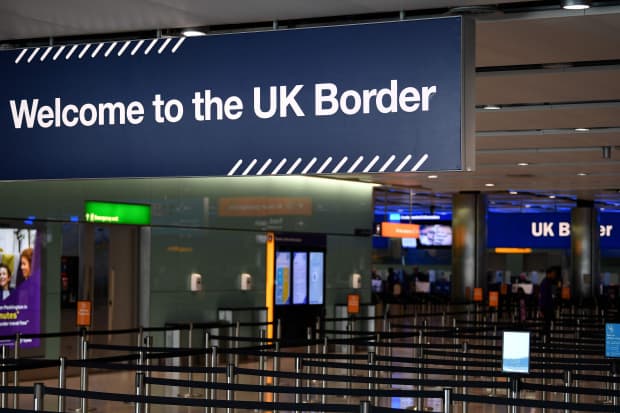This post was originally published on this site

From Dec. 5, high-value business travelers will no longer need to self-isolate when returning to England from countries not in a travel corridor.
daniel leal-olivas/Agence France-Presse/Getty Images
Senior company executives, elite sportspeople, and television production staff are among those travelers who will be exempt from COVID-19 quarantine restrictions for international arrivals in England, the government has announced.
“From 4 a.m. on Sat 5th Dec high-value business travelers will no longer need to self-isolate when returning to ENGLAND from a country NOT in a travel corridor, allowing more travel to support the economy and jobs. Conditions apply,” transport secretary Grant Shapps said on Twitter TWTR, +1.18%.
Under current rules, travelers from nonexempt countries have to quarantine for 14 days. However, from Dec. 15, they can cut this time to five days if they pay for a private coronavirus test under the government’s new Test to Release program. The tests will cost between £65 and £120.
In a more detailed statement, the Department for Transport said that “individuals undertaking specific business activity which would deliver a significant benefit to the U.K. economy — including activity that creates or preserves 50+ U.K. jobs — will no longer need to self-isolate when traveling or returning from nonexempt countries.”
It added that all travelers, including those from exempt destinations, will still be required to show a complete passenger locator form on arrival into the U.K., unless they fall into a small group of exemptions.
The move was criticized by Jim McMahon, shadow transport secretary of the opposition Labour Party, who tweeted: “Are you loaded? No quarantine.
“I hope the virus has been made aware of the rules and keeps well away from them.”
Labour lawmaker Ben Bradshaw also slammed the move, tweeting: “Is this a joke? What Is high value?”
However, the World Travel & Tourism Council (WTTC), which represents the global travel and tourism private sector, welcomed the government’s initiative, saying the decision will bolster business travel and provide a significant boost to the fragile U.K. economy.
“Last year, international business travel contributed £7.5 billion ($10 billion) to the U.K. economy, which demonstrates how vital it will be to reviving the country’s battered economic fortunes,” said Gloria Guevara, WTTC President and Chief Executive.
The news lifted shares in British Airways owner International Consolidated Airlines IAG, +5.02%, which rose 2.06%, while Ryanair RYAAY, +2.80% was up 1.22%, and easyJet EZJ, +2.66% edged 0.81% higher in Friday morning trading in London.
New guidelines published by the European Center for Disease Prevention and Control and the European Union Aviation Safety Agency on Dec. 2 suggest that there is no increased risk to the spread of COVID-19 from passengers arriving by air.
“Travelers should not be considered as a high-risk population, nor treated as contacts of COVID-19 cases, unless they have been in known contact with a confirmed positive case,” the guidelines said, adding: “Travelers should be treated in the same way as local residents and be subject to the same regulations or recommendations as applied to the local population.”
Responding to the guidelines, trade body the International Air Transport Association said they “unequivocally” show quarantines to be essentially politically-driven, non-risk-based measures, “which bear no relation to what is actually needed to safeguard public health.”
A study from consultants Oxera projected that among weekly incoming passenger volumes of 409,800 from the European Union to the U.K., only 0.01% of air travelers were expected to be infectious travelers being released into the U.K. population. This is the equivalent of one infectious person per 10,000 travelers.

